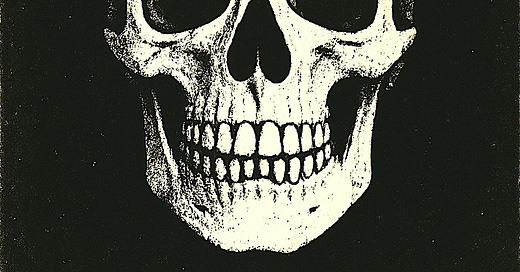Last month, my dear friend Mark Kaplan lost his sister Ina. Last week, my sister-in-law Claudine died. Both were lovely souls who expected to see another Christmas.
Death doesn't negotiate. It walks in uninvited, takes what it came for, and leaves the door swinging. You could be planning next Tuesday or finally ready to clean out the garage—doesn't matter. The game ends mid-sentence, mid-laugh, mid-breath.
This is what I've been thinking about while staring at my reflection, wondering when exactly I became this old man looking back at me.
There's a moment when you look in the mirror and think, Who the hell is that?
The face staring back isn't quite yours. More like a heat-warped photograph—recognizable but distorted. Time didn't ease into the picture. It moved in and rearranged everything while I wasn't paying attention.
My hair’s turned silver—and most of it’s already packed its bags and left. The skin folds under fluorescent lights like origami. My knees announce themselves every time I stand up.
But here's what surprised me: this isn't the tragedy I expected.
It's stranger than that. More interesting. The gravity gets stronger, but so does something else—a kind of clarity that wasn't there before. You stop caring about the wrong things because you finally understand what the right things are.
This isn't decline. It's recalibration.
We've been sold the idea that aging is failure. Every advertisement whispers the same message: if you look your age, you've given up. The anti-aging industry doesn't sell products—it sells panic.
Miracle creams. Stem cell treatments. Procedures with names like "liquid facelifts" that sound more like medieval torture than medical care. All promising the same impossible thing: that you can stop time if you just buy the right jar.
But I've noticed something about those "ageless" people in the ads. They don't look young—they look like older people wearing expensive masks. The uncanny valley of cosmetic enhancement, where nothing moves quite right and everyone has the same startled expression.
Meanwhile, my actual face—mapped with laugh lines and eybags and worry lines and the thin scar from falling off my bike at eight—gets treated like evidence of moral weakness.
The real fear isn't wrinkles. It's what wrinkles represent: the inconvenient truth that this ends. Aging is just the messenger delivering news we don't want to hear.
At seventy-five, here's what I know that I didn't at thirty:
Time moves differently now. Not faster or slower, but with more weight. Each moment carries the knowledge that there are fewer of them ahead than behind. This should be depressing. Instead, it makes everything more vivid.
Energy is finite, so I've stopped wasting it. The exhausting performance of being someone else's version of who I should be? Done with that. The need to win arguments with strangers on the internet? Completely gone. The compulsion to attend every social obligation? Vanished.
My body is not my enemy. It's been hauling me around for seven decades, surviving every stupid thing I've put it through. The grey hair and creaking joints aren't signs of failure—they're evidence of persistence.
Death isn't the opposite of life. It's the punctuation that gives life meaning. Without endings, there would be no stories. Without limits, there would be no urgency to love the people in front of us.
When I look in the mirror now, I see something different than the stranger I first noticed. I see the accumulation of every sunrise I've witnessed, every person I've loved, every mistake I've survived.
This face has told thousands of jokes and shed tears at beautiful music. These hands have held beautiful children and typed late-night letters to friends. This body has danced badly at weddings and walked through redwood forests and made love and made breakfast and made it through another day when that felt impossible.
You don't need to look young to be radiant. You just need to stop apologizing for being real.
The mirror doesn't show failure. It shows endurance. It shows a life fully lived, with the evidence written in the lines around my eyes.
And that, it turns out, is more beautiful than any cream could ever make me.
Ina and Claudine didn't get to finish their stories. The rest of us don't know how many pages we have left. So here's what I've decided: I'm going to say the important things. Call the people I love. Wear the Lucha Libre shirt I bought in Mexico City..
Because the only real tragedy isn't aging or dying—it's reaching the end without having lived.
The curtain is still up. The show isn't over.
Time to make it count.
_ _ _ _ _
Until we meet again, let your conscience be your guide.






That was incredibly brilliant Bret and I need to share it.. wow really got me thinking.. thank you
Bret, you are the finest writer I know; that is, besides myself. My life totally sucked until I hit 65 and then things began to fall into place. I was endowed with a durable body. At 77 I'm having great joy in my life learning piano. I'm a better version of that person I was at 30, 40, etc. I lost my brother in 1995 so there's an opening for...uh...soul brother.